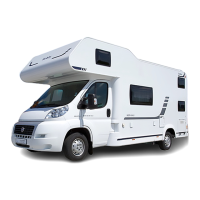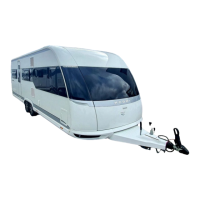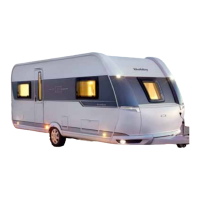
Do you have a question about the Hobby 750 UMF Landhaus and is the answer not in the manual?
| Brand | Hobby |
|---|---|
| Model | 750 UMF Landhaus |
| Category | Motorhomes |
| Language | English |
Covers camper development, safety regulations, technical condition, and handbook markings like texts, illustrations, and warnings.
Highlights safety instructions, owner responsibilities, warning labels, and vehicle/interior prep for driving.
Outlines steps for preparing the camper for driving, including hitching, tire bolts, lighting, gas bottles, windows, and securing loads.
Details interior prep, securing objects, closing doors, checking essentials, and pre-drive checks like first-aid kit and lighting.
Provides rules for loading the camper, emphasizing even weight distribution, securing heavy objects, and checking total weight.
Explains drawbar load importance for stability and rules for roof loads, including height and impact on performance.
Explains how trailer carriages behave differently during braking and advises on testing and proper usage.
Advises on shunting rules, notes blind spots, recommends test drives, and covers driving in various conditions.
Details reverse driving and curve driving rules, emphasizing caution with speed, radius, and potential rear overhang.
Covers first aid kit, warning triangle, and high-visibility vest, emphasizing their importance and placement.
Lists fire prevention measures and outlines procedures for fighting a fire, including evacuation and contacting emergency services.
Specifies maximum speeds and details requirements for 100 km/h driving, including vehicle features and tire age.
Provides rules for choosing parking, securing the vehicle with brake/stanchions, and redirecting electrical devices.
Discusses undercarriage components, dealer maintenance, original parts, and safety coupling WS 3000.
Provides steps for hitching/unhitching, including preparation, stabilization system, and inspection.
Explains activation, inspection of friction lining, and adjustment of the stabilization system.
Details maintenance for the tension ball coupler and coupling ball on the base vehicle, focusing on cleanliness and greasing.
Outlines vehicle registration process, required documents, biennial inspections, and FIN location.
Explains mass definitions per EU regulations, including gross vehicle weight rating, running order, and additional load.
Describes the location and operation of rotating stanchions for support, emphasizing they are not for leveling.
Provides instructions for entry step use and operation of the locking brake for parking the carriage.
Details inspection and adjustment of the overrunning brake system, including downhill braking precautions.
Advises on tire care, checking tread, wear, and pressure, and the risks of low tire pressure.
Covers tire profile depth requirements, age limits, and how to determine tire manufacturing date (DOT number).
Provides rules for using other rims, load capacity, and torque specifications for wheel screws.
Details preparation steps for changing a tire, including parking, securing the vehicle, and loosening wheel screws.
Guides on changing the wheel using the jack and explains how to use a tire repair kit for small cuts.
Explains the importance of proper ventilation for comfort and preventing damage, and the location of ventilation systems.
Details refrigerator ventilation bars and heating element ventilation flap, warning against blocking openings.
Provides instructions for opening/closing entry doors, service flaps, and other exterior locks.
Details operation of gas-bottle container flap, toilet flap, and exterior electrical socket cover.
Emphasizes exterior mirror adjustment for safety and offers rules for loading the roof rail.
Explains the operation of the entry door, including unlatching and latching the upper part for access and security.
Lists crucial safety tips for electrical installations, emphasizing authorized specialists, proper cable use, and fire risks.
Describes push-buttons on the service panel for controlling lights and systems, including secondary panels.
Details secondary panels for sleeping/washroom areas and mentions optional remote control for service panel.
Explains camper power supply via mains connection, including 230V CEE plug and system protection.
Provides rules for mains connection, cable specs, overload breakers, and details fuse assignment for 450VA supply.
Explains 12V operation from the base vehicle battery, advising to switch off on stops and noting refrigerator function.
Details manual and automatic operation of the Truma-Vent blower unit, including adjustment and turning off.
Provides step-by-step instructions for changing taillight bulbs, including removing the taillight and accessing the bulbs.
Presents the interior circuit diagram for the Hobby Light Control System 2007, detailing connections for various interior lights and functions.
Shows the exterior circuit diagram for 12V electrical installation, including lighting and connector pin assignments.
Lists the contacts of sockets in accordance with DIN 1648-1:97, detailing the circuit for each pin on the 13-poled outlet.
Describes various interior lighting types: halogen spotlights, corner shelf lamps, indirect lighting, and suite ceiling lamps.
Explains the electric floor heating, its location, purpose to prevent heat loss, and technical data.
Provides instructions for opening/closing furniture flaps and doors, emphasizing securing them before driving.
Describes the rotating TV/bar media storage cupboard, its connections, and how to unlock and swing it out.
Details how to open/shut hinged windows and operate separate shades and insect screens.
Covers roof bonnet safety instructions, operation for opening/closing, and shade/insect screen adjustments.
Provides conversion steps for the elevating table model to transform seat groups into beds.
Details safety measures for children's beds, including window security and precautions for upper beds.
Explains water supply via immersion pump, power sources, pump rules, fresh water tank, and waste water tank.
Provides toilet preparation, operation, faeces tank emptying, and storage instructions.
Outlines warm water supply rules, therme emptying, and electric operation details.
Covers general safety for liquid gas facilities, inspection, regulator knobs, hoses, waste gas, and pre-use checks.
Describes gas supply, bottle container, changing gas bottles safely, and using shutoff spigots/valves.
Details heating element models, operation, and changing ignitor batteries.
Explains the three methods of operating the refrigerator: 12V, 230V, and liquid gas.
Details pre-use checks and operation of the gas cooker, including burner ignition and safety precautions.
Refers to Alde heating system and Truma boiler instructions, advising to follow manufacturer's guides.
Advises noting SMEV operating instructions before initial oven operation and use only during 230V operation.
Advises noting accessory instructions and warns that modifications may endanger vehicle performance if not approved.
Outlines maintenance intervals, including first dealer maintenance and annual checks for camper and devices.
Explains ventilation importance and provides basic upkeep rules for cleaning the exterior.
Provides rules for exterior cleaning, including washing, high-pressure cleaner use, and drying.
Advises on polishing surfaces and stresses immediate repair of all damage to prevent corrosion.
Details cleaning rules for windows, doors, interior surfaces, upholstery, curtains, and carpets.
Provides rules for cleaning the toilet area and enamel sink, emphasizing appropriate cleaners.
Discusses camper suitability for winter and outlines preparation steps including vehicle inspection and protection.
Explains condensation issues in winter and provides rules for ventilation and frost protection measures.
Provides rules for upkeep after winter, including washing underside, cleaning exterior, and removing chimney extension.
Emphasizes environmentally sound use, responsible waste disposal, and acting as a role model.
Details rules for waste water and faeces disposal, emphasizing collection in tanks and proper disposal methods.
Provides a table of tire sizes and their corresponding air pressure in bar.
Lists weights for various camper models according to 97/27/EG regulations, including empty weight and load capacity.
Details the basic equipment included for safe vehicle use, listing weights for liquid gas supply, fluids, and electric supply.
Lists lighting specifications for 12V vehicle lighting and 12V/230V interior lighting, including voltage and wattage.











